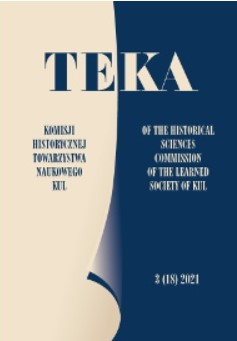ROZPROSZONE DZIEDZICTWO. KWESTIA REWINDYKACJI POLSKICH ZASOBÓW ARCHIWALNYCH
DISPERSED HERITAGE. THE ISSUE OF THE REGAINING OF POLISH ARCHIVAL RESOURCES
Author(s): Anna KrochmalSubject(s): Cultural history, Archiving, Modern Age, Pre-WW I & WW I (1900 -1919), Interwar Period (1920 - 1939), WW II and following years (1940 - 1949)
Published by: Towarzystwo Naukowe Katolickiego Uniwersytetu Lubelskiego Jana Pawła II
Keywords: recovery of archives; restitution; archival heritage; Treaty of Riga; Adam Stebelski’s mission;
Summary/Abstract: Poland is a country with one of the most dispersed archival resources. This situation was clearly influenced by important historical events, including, in particular, the catastrophe of partitions at the end of the 18th century and the two subsequent world wars. From the 17th century until the Second World War, there were looting or relocating Polish cultural goods to Poland’s neighboring countries (mainly Russia and Germany). The article presents the main stages of recovery proceedings in relation to archival materials undertaken by the Polish state against its neighbors from Eastern and Western Europe. The first attempts to restore the plundered collections took place in the 17th century, based on the provisions of the peace treaties in Oliwa (with Sweden concluded in 1660) or in Andruszów (truce with Russia in 1667). The first major recovery action, which brought concrete results and concerned lost cultural goods, was the implementation of the provisions of the Treaty of Riga of March 18, 1921. Article XI of the Treaty was of fundamental importance for archival matters. It provided for the return from Soviet Russia of all materials taken from Poland after January 1, 1772. A Mixed Polish-Soviet Special Commission was established to implement these decisions, with the participation of eminent specialists (historians, archivists, librarians). Their activities resulted in the return to 1924 of 31 wagons of archival materials, including archives from the period of the First Polish Republic and files taken by the Russians in 1915. Files from Austria and Germany were restored during the Second Polish Republic on a much smaller scale. The second wave of recovery took place after 1945. The main materials recovered from Germany were the result of the so-called Adam Stebelski’s mission in 1946-1949. Archives from the USSR returned to Poland twice, in the years 1945-1952 and 1957-1964. Until today, many source materials taken from Poland to the USSR or Germany have not been recovered, therefore recovery remains a topical and open issue in relations with these countries.
Journal: Teka Komisji Historycznej Towarzystwa Naukowego KUL
- Issue Year: 18/2021
- Issue No: 1
- Page Range: 113-158
- Page Count: 46
- Language: Polish

